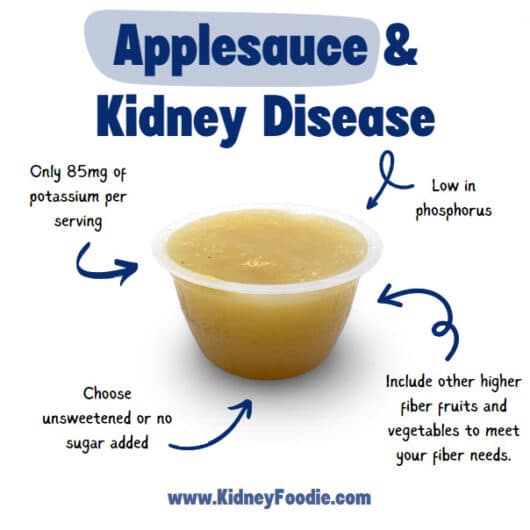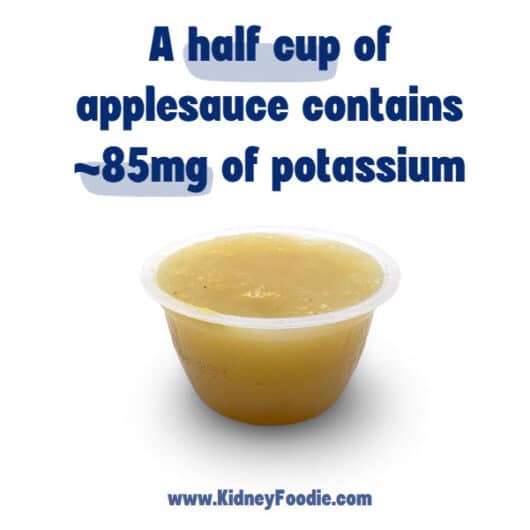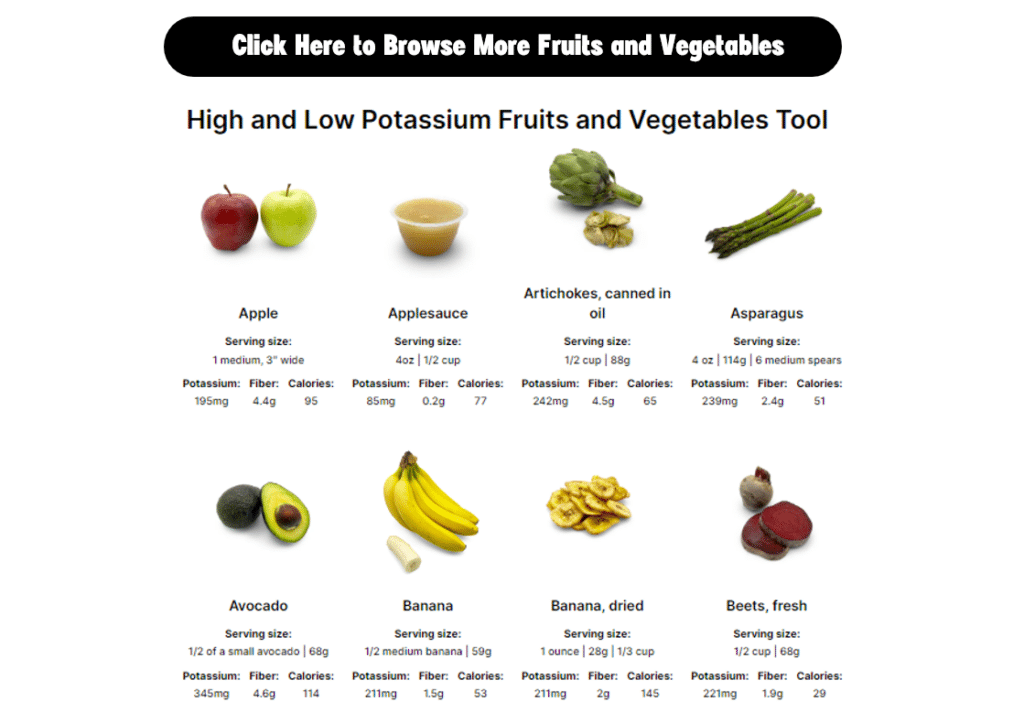Is applesauce good for kidneys?
Applesauce is not bad for your kidneys, but it is a processed fruit, so it isn’t quite as good as eating a whole apple. When comparing the same sized portions of applesauce vs. a whole apple, the raw apple will have twice as much fiber as well as more vitamins and nutrients such as Vitamin C, Vitamin K, and magnesium.
This post may contain affiliate links through which we may earn a small commission to help keep this website free.
Applesauce is often sweetened with additional sugar, which everyone should be mindful of. We recommend choosing unsweetened applesauce since it does not contain added sugar. Applesauce is typically made without the skin of the apple, so it loses some of those valuable nutrients. For example, applesauce tends to have less fiber than an apple. But applesauce does have some advantages which I’ll talk about in just a moment.

Does applesauce have potassium?
Yes, one half cup of applesauce contains approximately 85mg of potassium.
Most kidney professionals consider a vegetable to be high potassium if it contains more than 200mg of potassium per serving, so applesauce would be considered a low potassium fruit.
If you have kidney disease, you should not restrict your intake of fruits and vegetables because of potassium content unless instructed by your kidney dietitian or healthcare provider. Many people who have kidney disease do not need to restrict their intake of potassium. There are many other factors that could cause you to have high potassium levels that are not related to the amount of potassium in your food.
For example, constipation can lead to higher potassium levels in people with chronic kidney disease. Getting in adequate fiber can help you manage your potassium better because it helps relieve constipation, so people with kidney disease are able to remove more potassium from their body with their bowel movements.
Raw apples may contain a little bit more potassium than applesauce, but they also contain twice as much fiber which will help your body manage potassium better in the long run.
You can also learn more about managing potassium and kidney disease through our courses or by signing up for our complimentary newsletter.

Is applesauce high in phosphorus?
No. One half cup of applesauce contains about 8mg of phosphorus. The phosphorus found in applesauce is natural and poorly absorbed by the body, so it is considered a low phosphorus food.
For more information about phosphorus and kidney disease, check out our youtube video.
What are the benefits of applesauce?
- Applesauce does contain vitamins and antioxidants. Antioxidants consumed through fruits and vegetables are considered to have protective effects against many chronic diseases.
- Research shows that a low intake of fruits and vegetables is associated with an increased risk of developing kidney failure in people with kidney disease (as well as those who don’t have kidney disease). This suggests that getting adequate fruits and vegetables is important for people with kidney disease.
Healthy ways to eat applesauce
- If you are on a fluid restriction, applesauce is a great alternative to water for swallowing medications in pill form.
- Applesauce can be enjoyed plain.
- Use it as a natural sweetener in your morning oatmeal like we did with our Kidney Friendly Apple Cinnamon Oatmeal.
- Add it to homemade baked goods for additional flavor and moisture
Is applesauce high in oxalates?
Applesauce is considered a low oxalate food (Source) If you are prone to developing kidney stones, avoiding oxalates is not necessarily the best approach to preventing future stones. I recommend signing up for my free kidney stone newsletter where I talk a lot about kidney stones, how to read your labwork, and what nutrition strategies to implement to prevent future stones.
Oxalates are naturally occurring compounds found in many foods. When consumed, oxalates can bind with calcium in the body to form crystals, which can contribute to the formation of kidney stones in some individuals.
Kidney stones are hard deposits that form in the kidneys when there are high levels of certain substances, such as calcium, oxalate, and uric acid, in the urine. The most common type of kidney stone is calcium oxalate stones, which are formed when calcium and oxalate combine in the urine.
While oxalates are present in many foods, not everyone who consumes oxalates will develop kidney stones. Factors such as individual susceptibility, overall diet, and lifestyle choices play a role in kidney stone formation.
The highest oxalate fruits and vegetables are spinach, rhubarb, and swiss chard. However, it’s important to note that the mere presence of oxalates in food does not guarantee kidney stone formation. If you are not prone to developing kidney stones, then there is no reason to avoid foods that are high in oxalate.
High and Low Potassium Fruit and Vegetable Tool
Looking for more information on other kidney friendly fruits and vegetables? Check out our Fruit and Vegetable Potassium Tool.

